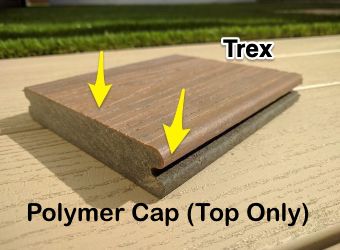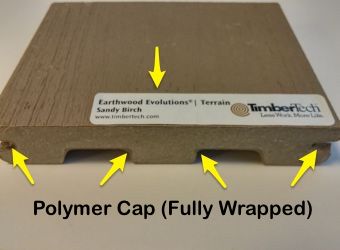There are a lot of benefits to adding a beautiful deck to your home or cabin. By investing in a quality deck, you can have your friends and family over for barbeques, you can sunbath during the warmer months, and gazing at the stars on those cool nights will be that much more fun. However, before you take the plunge, you’ll need to decide what kind of material you want your deck to be made out of.
In recent years, many homeowners have chosen composite decking over traditional wood. Why? Composite decking lasts longer, there’s no sanding or staining involved, and they’re much more durable. Composite decking is really the better choice for most people.
Timbertech and Trex are two of the most popular composite decking companies in the decking industry. Both of these companies produce high-quality decking products. However, when faced with the decision of choosing between Timbertech and Trex, which is the better pick for your property? In order to make an accurate decision, you’ll want to look at price, materials, maintenance, and the warranties for each.
Timbertech vs. Trex: Pricing
The first thing you’ll want to look at is the cost of both Timbertech and Trex. For most people, price is an important factor when investing in new home improvement projects.
Both Timbertech and Trex have a higher price tag than pressure treated wood. This bump in price is definitely reasonable when you consider that Timbertech and Trex don’t need to be sanded down and stained regularly. This will save you more cash in the long run. Timbertech and Trex each have three popular composite decking products each. They include:
Timbertech Terrain
Length: 16 feet
Price per board: $65
Timbertech Tropical
Length: 16 feet
Price per board: $78
Timbertech Legacy
Length: 16 feet
Price per board: $91
Trex Select
Length: 16 feet
Price per board: $43
Trex Enhance
Length: 16 feet
Price per board: $47
Trex Transcend
Length: 16 feet
Price per board: $68
* Price estimation source:thedeckstoreonline.com
From looking sat the prices listed above, Timbertech is more expensive than Trex. Now, that doesn’t mean that Trex isn’t a good product, because it is. If you’re a fan of Timbertech products, plan to pay a little extra.
Timbertech vs. Trex: Materials
Even though Timbertech and Trex have their similarities, they’re definitely different when it comes to how they’re constructed. Trex decking is made up of two specific pieces. They include the protective shell and the composite core.

Trex
The protective shell covers three sides of the Trex board. The top and both sides. However, it doesn’t cover the bottom. The great thing about having boards with an unsealed bottom is that they give the material the freedom to breathe while also eliminating surface separation.
The inside of Trex boards is made up of composite material. This composite material is composed 95% of recycled plastics and sawdust. The thing homeowners need to realize is that composite decking is actually 50 to 70 percent heavier than pressure treated wood. This extra weight also helps keep the Trex boards in place.

Timbertech
Timbertech boards are a little different. Although they’re composed of recycled material just like Trex, these boards have a protective shell made from polymer that covers all four sides. The bottom isn’t left open like with Trex. Because of this extra protection instead of an open bottom, Timbertech is more resistant to harsh weather, the hot sun, and moisture.
Timbertech vs. Trex: Scratching
Although Timbertech and Trex are tough materials, they can still be scratched. However, when tested for scratch resistance, Trex tends to be more resistant than Timbertech.
As mentioned above, to keep your composite deck in good condition, it’s recommended you treat it with a sealer. A quality sealer will not only prevent the growth of mold, it’ll also make your deck more resistant to scratches too. A little investment will go a long way.
Timbertech vs. Trex: Warranty
Both companies provide their customers a 25-year limited warranty. This consists of all defects in workmanship and materials including splitting, forming splinters, rotting, and structural damage.
The only difference between Timbertech and Trex is that Trex provides their customers a 25-year warranty for staining and fading whereas Timbertech offers their customers a 30-year warranty. Their warranties are quite similar including the restrictions that govern the warranties.
When a customer does take advantage of their warranty, both companies will either replace the damaged boards or refund a portion of the money for the defected items. This does not include the cost of the initial installation.
Now, when it comes to fading, both warranties state that their composite decking will not fade more than 5 Delta E units from either the weather or the light from the sun otherwise they will refund or replace the discolored boards.
If you’re unfamiliar with what Delta E is, it’s a way of measuring the oddities between two or more colors. To put things into prospective, a color labeled as 1 Delta E is going to be very visually different that a color labeled as 10 Delta E.
As mentioned above, your deck must have faded to a level of 5 Delta E or more for the warranty to be used. This means that even though your deck is experiencing fading, you won’t be able to use your warranty unless it meets at least a 5 Delta E rating. So, what can you do? A quality sealer will protect your deck from not just mold, but it can also help prevent your deck from fading over the years. It’s advised that you treat your composite deck in the spring and the fall.
Both Timbertech and Trex claim that their products are resistant to mold and mildew. However, when it comes to their warranties, they state that a customer is responsible for cleaning their deck on a regular basis. This includes cleaning off the mold, dirt, and pollen. The warranty will not be valid for homeowners who have not held up their part of the deal. On the other hand, if you have cleaned your deck periodically, and you still see mold growing, then your warranty just might cover the damage.
The last thing you need to understand about the Timbertech and Trex’s warranties is that they are based on a progressive scale. Another words, the older deck is, the less of a percentage you’ll receive for replacement costs. The time recorded is based on the year that you made the claim. The older the deck, the less of a percentage you’ll receive. See the rates below:
Trex Warranty Coverage
1 to 10 years old: 100%
11 to 13 years old: 80%
14 to 16 years old: 60%
17 to 19 years old: 40%
20 to 22 years old: 20%
23 to 25 years old: 10%
Timbertech Warranty Coverage
1 to 10 years old: 100%
11 to 12 years old: 90%
13 to 14 years old: 80%
15 to 16 years old: 70%
17 to 18 years old: 60%
19 to 20 years old: 50%
21 to 22 years old: 40%
23 to 24 years old: 30%
25 to 26 years old: 20%
27 to 30 years old: 10%
As you can see from the information above, you’ll receive a greater recovery rate from Timbertech over the years than you will from Trex. Both companies offer excellent warranties, but you’ll be better protected over the years when you choose Timbertech.
Timbertech and Trex: Maintenance
Like mentioned earlier, both Timbertech and Trex don’t need to be sanded and stained regularly. In addition to this, Timbertech and Trex are quite resistant to warping, cracking, and rotting, even after years of usage. Now, does that mean they can’t be damaged? Not exactly. So, with all that being said, how do you properly maintain your Timbertech or Trex deck?
It’s recommended that you clean your Timbertech or Trex deck with warm water, soap, and a soft sponge or cloth. By doing this regularly, you can keep your deck looking great for years to come while also removing any mold that might have accumulated. You can also use a power washing machine for deep cleaning. However, you have to do it right, or you could damage your deck.
If you do decide to power wash your deck, make sure you only use a fan tip, and you should never go over 1,500 psi. In addition to this, always make sure you don’t keep the tip of the nozzle closer than 8-inches from the surface. By holding the tip of the spraying nozzle too close to your deck, you could leave permanent damage.
Now, if you live in a geographical area that experiences a humid climate at some point of the year, then you will also need to treat either your Timbertech or your Trex decking. Why? By not treating your Timbertech or Trex deck, the humidity can cause mold to grow on and in the decking boards. This most will more than likely leave little, noticeable spots all over your deck. These little mold spots will really affect the overall appearance. To prevent this from happening, it’s recommended that you treat your deck in the spring and the fall. That’s a total of two times a year.
If you’re wondering what kind of products you should use on your deck to prevent the growth of mold, Composite Waterproofing Sealer by Defy is a product with fantastic reviews. This waterproof sealer will prevent moisture from seeping in which is the root cause of the growth of mold.
Should you choose Timbertech or Trex?
When trying to decide between these two products, you should consider first your geographical location. If you live in an area with a lot of humidity, you may want to choose Timbertech decking, because they don’t have open bottoms where mold can grow.
On the other hand, the design of the Trex open bottom boards prevents surface separation. This design also gives the material the freedom to breathe.
Another thing you’ll want to consider is the price of both materials. Timbertech is more expensive than Trex, but that doesn’t mean Trex isn’t a quality product, because it is.
Lastly, Trex doesn’t scratch nearly as easy as Timbertech. If you have several kids, or you plan on having lots of furniture on your deck, then Trex is probably the best choice. These are the kind of things you’ll need to consider before choosing between Timbertech and Trex.
- Painting Over Powder Coat and What You Need to Know - February 1, 2022
- How to Get Rid of Humidity in a Basement Without a Dehumidifier - December 17, 2021
- How to Fix a Crack in Drywall That Keeps Coming Back - September 22, 2021

Monica
Sunday 7th of April 2024
This article is definitely helpful in my decision making 👏
NK Calle
Thursday 25th of January 2024
Hey Mike. Thank you for this comparison article. Very very helpful!